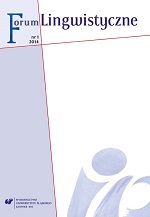Współczesne zmiany rekcji czasowników jako przejaw stałej tendencji w dziejach polszczyzny (na przykładzie dopełniacza i biernika)
Contemporary changes in the case government of the verbs as a manifestation of the continual tendency in the history of Polish language (based...)
Author(s): Magdalena Pastuch, Mirosława SiuciakSubject(s): Language and Literature Studies
Published by: Wydawnictwo Uniwersytetu Śląskiego
Keywords: tendencies in language; history of Polish language; object in accusative and genitive; normativity
Summary/Abstract: The article takes up the subject of the contemporary variations in the case government of certain Polish verbs which result from the replacement of objects in the genitive with objects in the accusative. Contemporarily, this phenomenon is treated as a deviation from the accepted norm, despite it being observed not only in the spoken language, but also in written texts and in different kinds of mass media (press, TV, the Internet). Nevertheless, language normativists do not allow the variance (acc. // gen.) of the object. As it has been corroborated with the use of historical linguistic analysis, the discussed phenomenon is not new in the Polish language, but stems from a constant tendency to optimize the syntax, which in this case results in the unification of the direct object in the form of the accusative. This process, taking place since the 16th century, has led to the change of the case government (from genitive to accusative) of hundreds of Polish verbs. This process was being restrained in the 20th century by quite vigorous normative actions. The continuous conflict between superior directives and the natural tendencies of language causes, on the one hand, considerable problems for native speakers and, on the other, leads to an even bigger discrepancy between written norm and common usage.
Journal: Forum Lingwistyczne
- Issue Year: 2014
- Issue No: 1
- Page Range: 77-87
- Page Count: 11

